Sitting at over 14,000 feet tall, and seen from the skyline of Seattle, Washington, is the phenomenal Mount Rainier. This active volcano is the main attraction at the national park, which has over 250 miles of trails to explore.
Between the epic mountainous views, wildflower-filled meadows, and roaming wildlife, you simply won’t be disappointed if you pay the park a visit. And the best way to see this majestic mountain is to head out on one of these trails. Here are the best hikes in Mount Rainier National Park to check out.
Table of Contents
Best Hikes in Mount Rainier National Park
This national park is filled with a variety of hikes, many of which are perfect for beginners and people of all skill levels. Here are the top easy hikes in Mount Rainier National Park.
Best Easy Hikes in Mt. Rainier National Park
1. Nisqually Vista
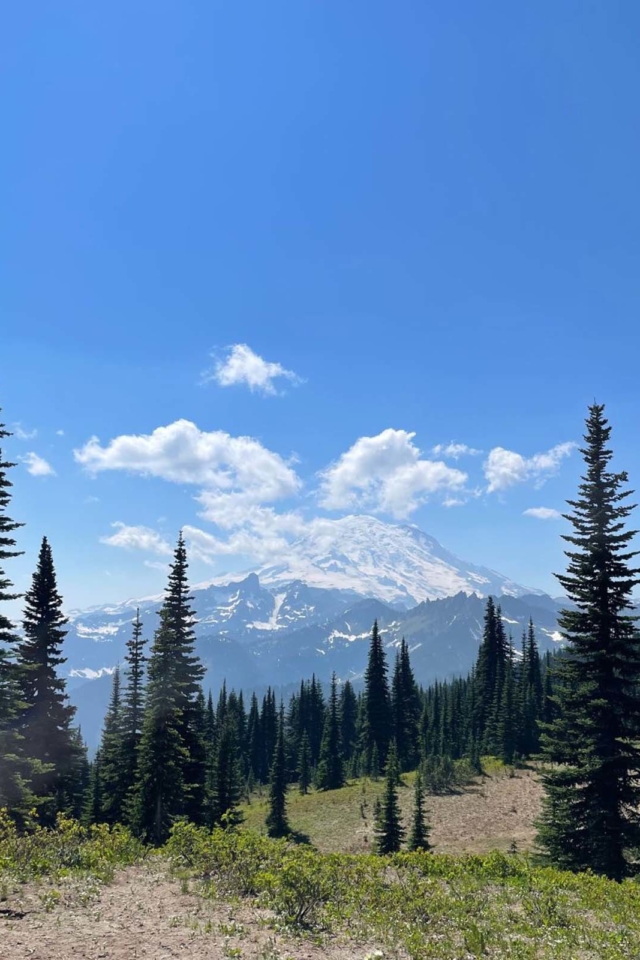
This short trail starts from the Henry Jackson Visitor Center and is the perfect hike to bring the entire family on. It’s paved, so it’s doable for most people and won’t take too much time out of your day.
If you plan your visit in August, it’s pretty likely that you’ll spot some of Mount Rainier’s famous wildflowers.
With minimal effort, you’ll have fantastic views of the mountain and the flowers on the Nisqually Vista trail.
- Distance: 1.1 miles
- Elevation: 180 feet
- Estimated Time: 45 minutes
Type: Loop - Area: Paradise
2. Grove of the Patriarchs
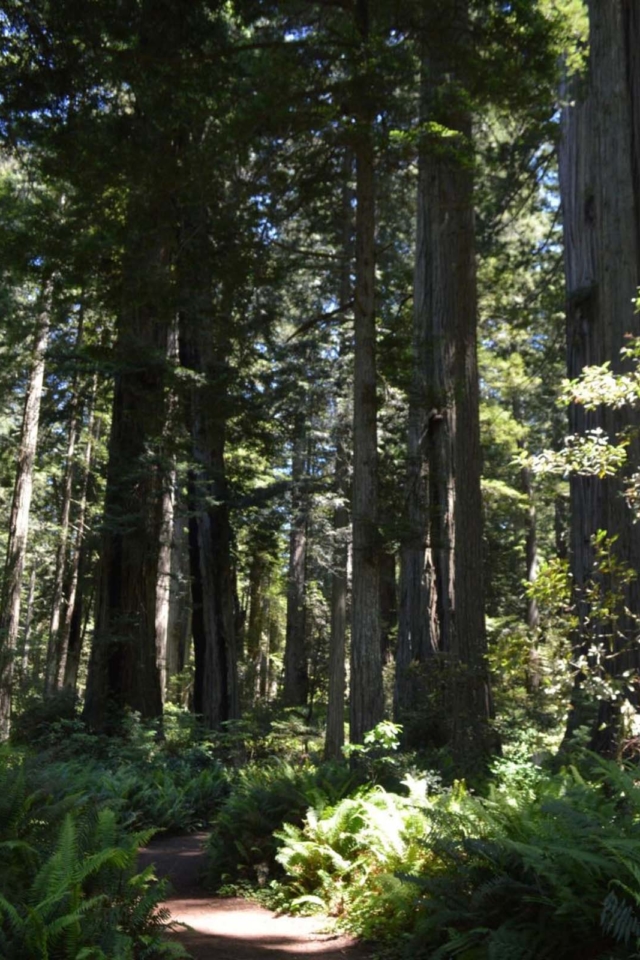
The Grove of the Patriarchs hike is unique from a lot of the other trails in the park because instead of walking through mountains, you’re in an old-growth forest.
You’ll have the opportunity to walk across a suspension bridge and explore a small island filled with old-growth trees, mosses, and flowers.
It’s definitely one of the more popular trails in the park, particularly because it provides such an interesting feel, compared to other trails, and is doable for almost anyone.
- Distance: 1.1 miles
- Elevation: 50 feet
- Estimated Time: 45 minutes
- Type: Out & Back
- Area: Ohanapecosh
3. Myrtle Falls
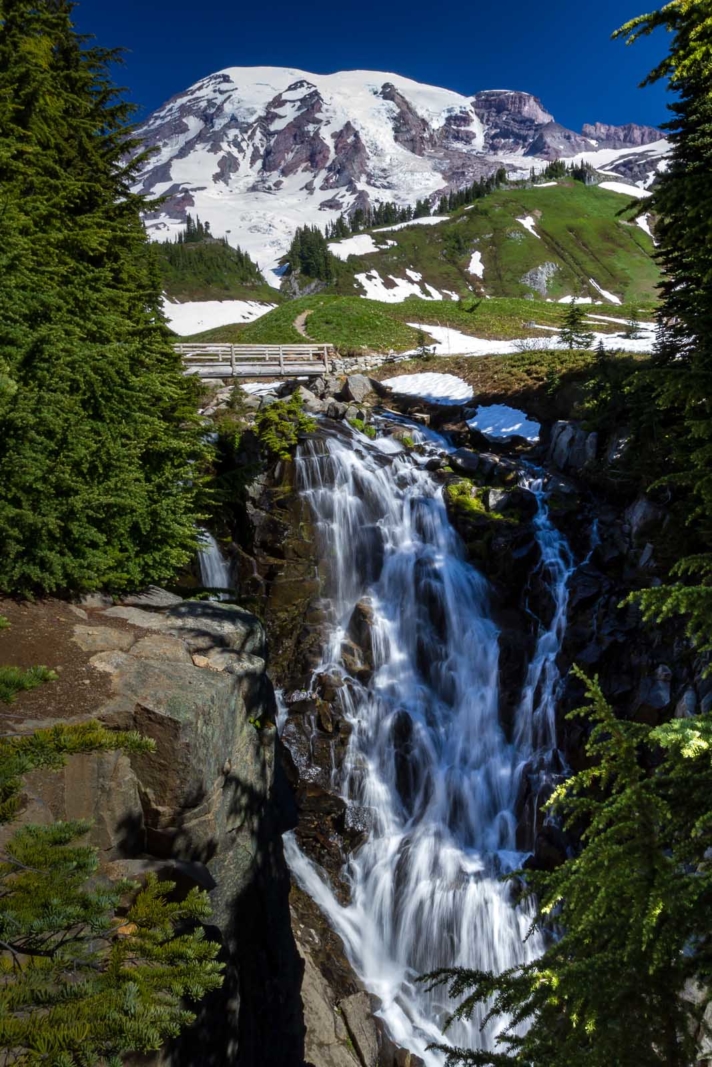
The viewpoint of Myrtle Falls is a definite must-see in Mount Rainier National Park.
You’ll walk along the first part of the Skyline Trail, which is paved, for about 0.4 miles before reaching the waterfall.
On a clear day, you’ll have an epic view of Myrtle Falls and Mount Rainier in the background. And on foggy days, you’ll still get to enjoy the beautiful waterfall.
You can turn around at Myrtle Falls for this easy hike, or continue hiking to head onto the Skyline Loop.
- Distance: 0.8 miles
- Elevation: 150 feet
- Estimated Time: 30 minutes
- Type: Out & Back
- Area: Paradise
4. Sunrise Nature Trail
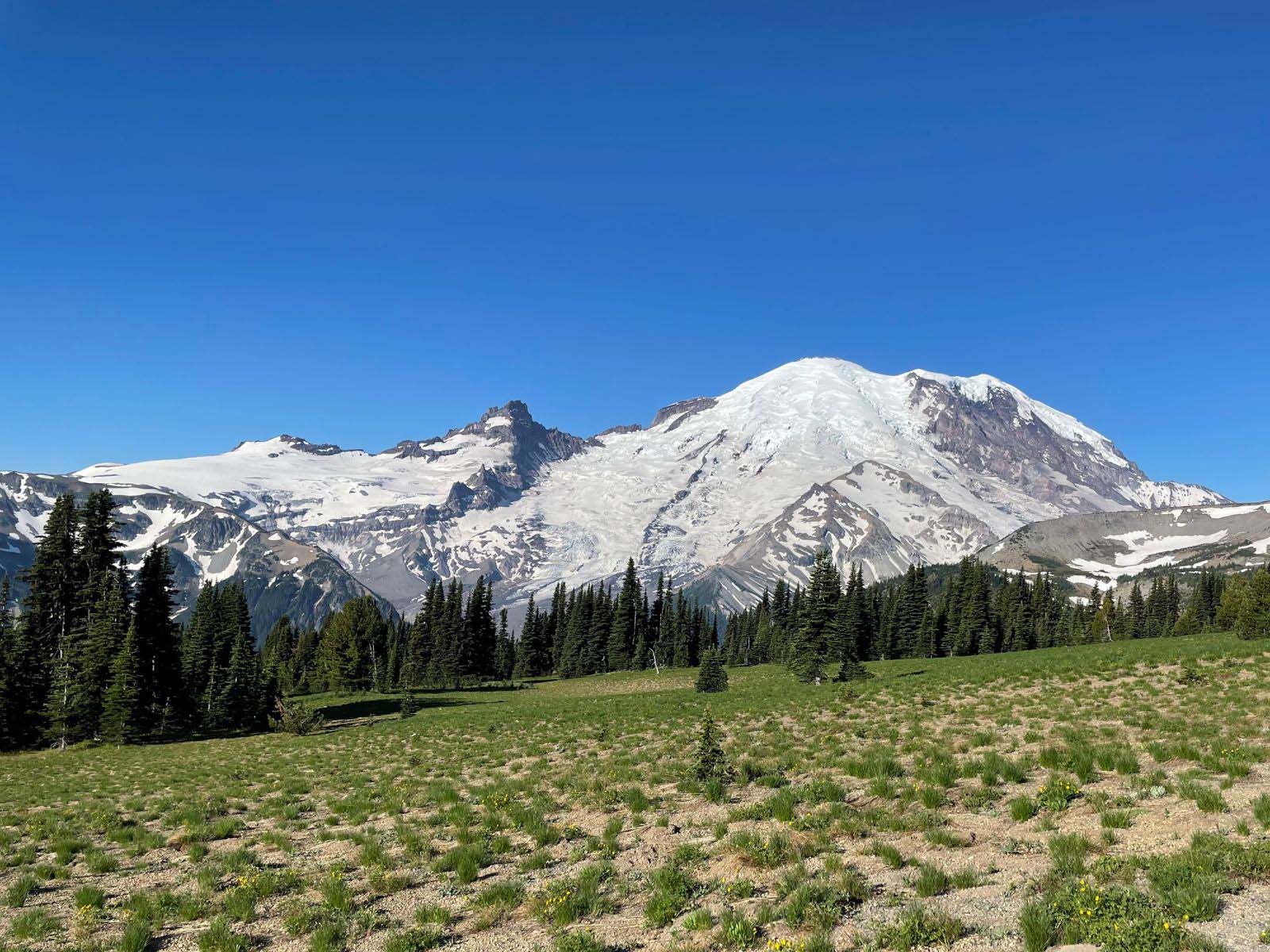
This easy loop trail starts at the Sunrise Day Lodge and showcases just how beautiful the park is, even in just a short distance.
Sunrise Nature Trail shows that you really don’t have to travel very far to get great views at this national park!
During this hike, you may see mountain goats, marmots, and more wildlife as they graze the fields and wander the park.
You’ll also get to view Mount Rainier from a different perspective, with wildflowers blooming all around.
- Distance: 1.5 miles
- Elevation: 400 feet
- Estimated Time: 1 hour
- Type: Loop
- Area: Sunrise
5. Tipsoo Lake Loop
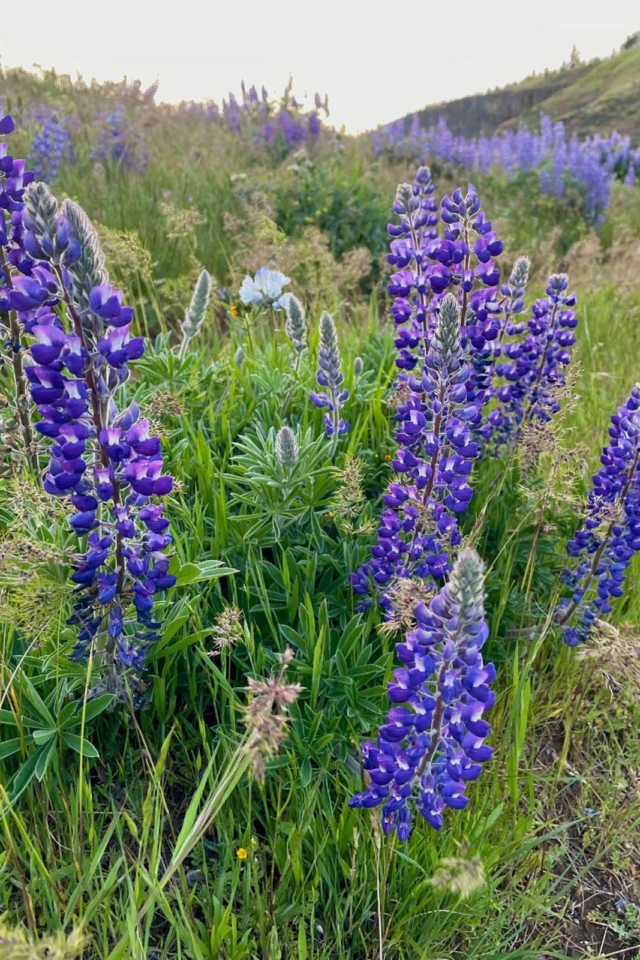
This very easy hike circles a small lake with mountain views in the background. It’s a great family-friendly hike with almost no elevation gain or tough terrain.
In the summer, wildflowers bloom around the lake, making the scene burst with shades of purple and yellow. I would recommend putting on some bug spray before you head out though because mosquitos are definitely present here!
- Distance: 0.8 miles
- Elevation: 50 feet
- Estimated Time: 30 minutes
- Type: Loop
- Area: Sunrise
Best Moderate Hikes at Mount Rainier National Park
These moderate hikes in Mount Rainier National Park are great for those wanting to explore a bit more but still not do anything too difficult.
With less elevation, shorter distances, and still epic views, these are perfect to spend half of the day.
6. Naches Peak Loop
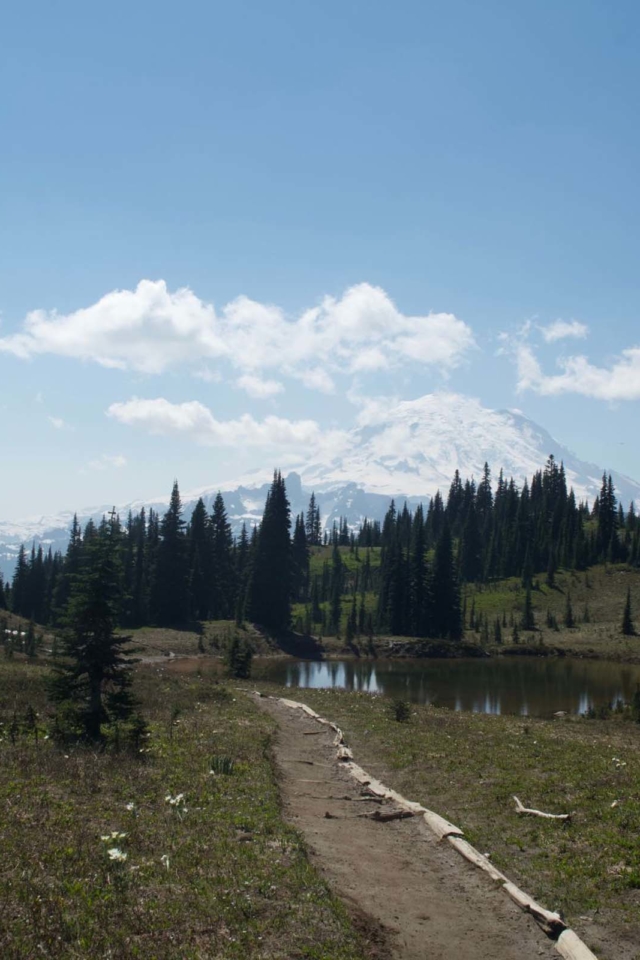
The Naches Peak Loop Trail is a great hike to gain a whole new perspective of Mount Rainier. It’s part of the Pacific Crest Trail, so you may even see hikers with backpacking gear who are completing a thru-hike of the trail.
This area is especially gorgeous in the fall time when the foliage starts to turn shades of red and orange. It’s truly a magical time to visit.
I’d recommend heading counterclockwise on this loop because it provides the best views, and on your way back to the trailhead, you’ll have an amazing spot to stop and grab a photo.
Not too long after you’ve made the corner for the loop, you’ll hike beside a small pond that makes for one of the best photography spots along the trail.
As you make your way back to your car, you’ll also hike around Tipsoo Lake, so it’s almost like a two-for-one!
- Distance: 3.3 miles
- Elevation: 650 feet
- Estimated Time: 2 hours
- Type: Loop
- Area: Sunrise
7. Tolmie Peak Loop
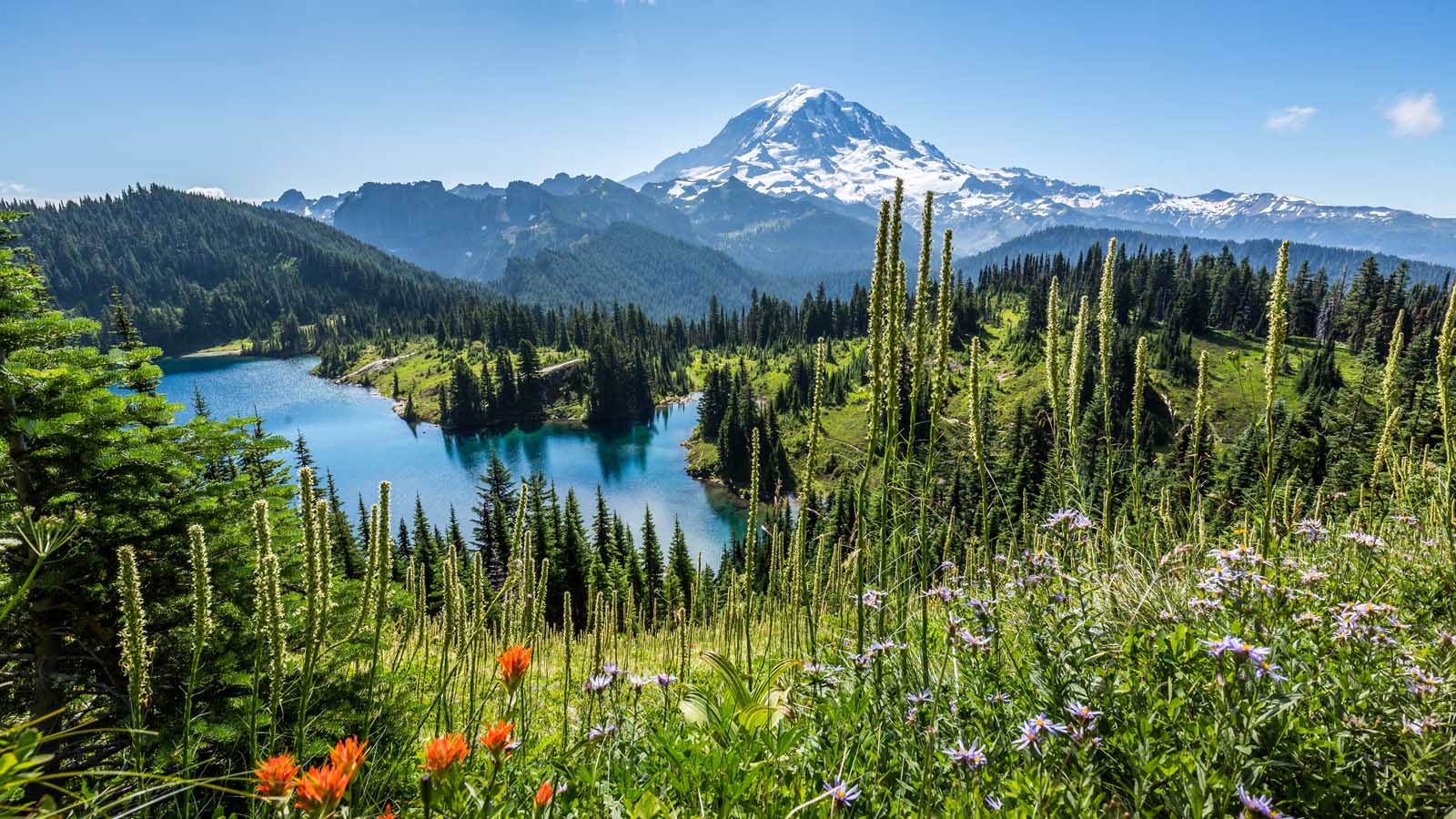
If you’re looking for a phenomenal hike in Mount Rainier that isn’t super crowded, then you’ve found the perfect one.
The Tolmie Peak Loop trailhead is located near Mowich Lake in a much more remote part of the park than most of the other hikes. Because of this, there are fewer crowds and you’re able to enjoy the hike a little bit more without so many people.
Enjoy the first mile or so of the trail, because, after this, it starts to incline and you’ll be gaining some steady elevation.
Once you’ve reached the Tolmie Peak Fire Lookout, you’ll be blown away by the views. In the distance, you’ll see Mount Rainier, and below sits Eunice Lake.
If you’d like to cut off a little bit of distance and elevation, you may choose to stop near Eunice Lake, but I highly recommend trekking on to the lookout. It’s so worth it!
- Distance: 5.6 miles
- Elevation: 1,600 feet
- Estimated Time: 3 hours 30 minutes
- Type: Loop
- Area: Carbon River & Mowich
8. Mount Fremont Fire Lookout
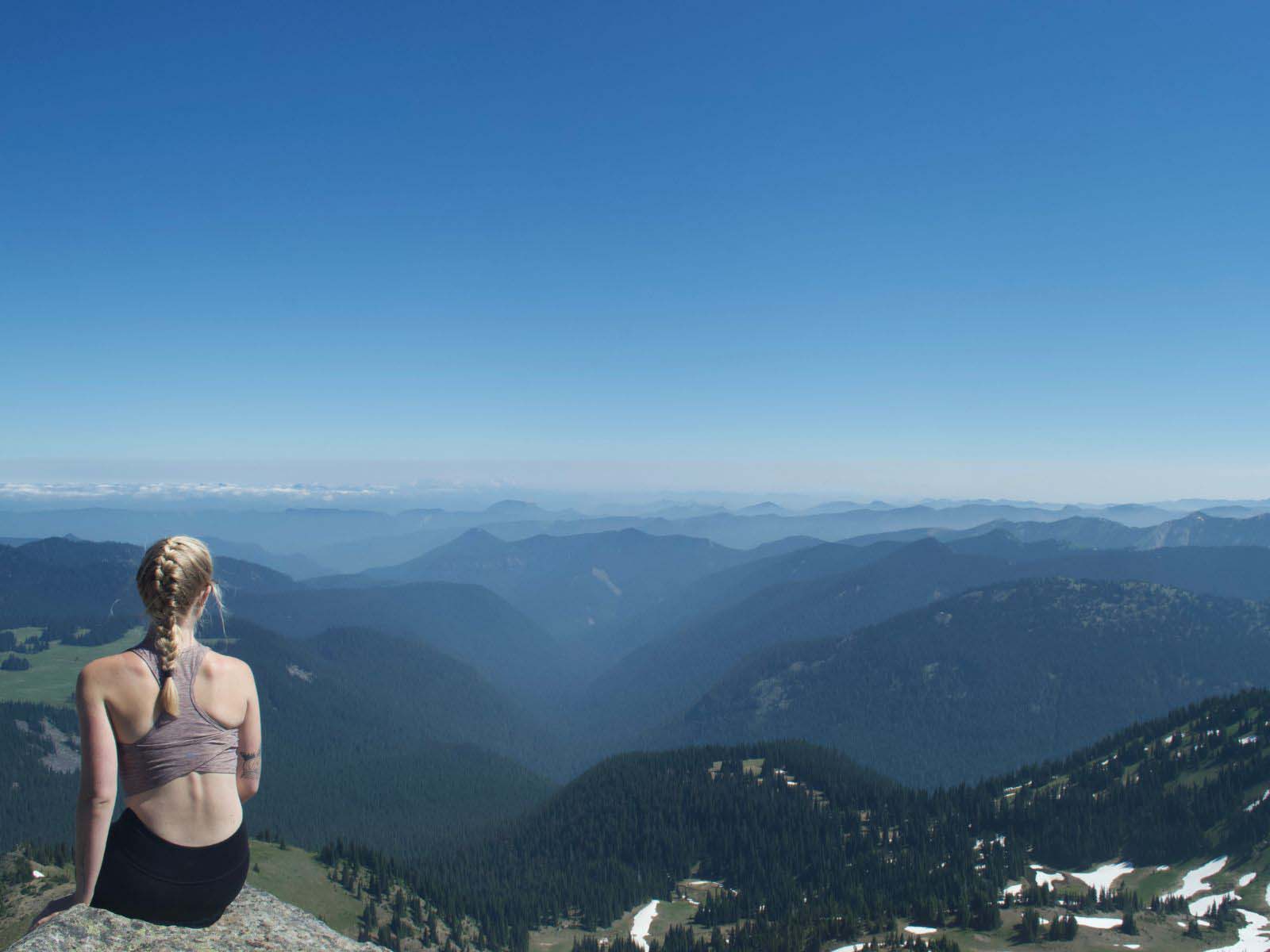
Probably one of the most well-known hikes in Mount Rainier National Park is the Mount Fremont Fire Lookout trail. This moderately challenging trail has breathtaking views the entire way and leads you to a fire lookout overlooking the surrounding landscape.
This is probably one of the best places to catch a sunrise or sunset in the park. Early in the mornings, you may even feel like you’re in the sky, as the clouds float and cover the ground.
Keep an eye out for mountain goats as they graze the hillsides around the lookout.?
While this hike is one of the best in the park, it definitely gets very busy and you’re likely to be surrounded by tons of people. I recommend arriving early to ensure that your view at the fire lookout isn’t obstructed by other hikers.
Even with the crowds, it’s worth the effort, because these are some of the best views of Mount Rainier in the park.
- Distance: 5.6 miles
- Elevation: 1,100 feet
- Estimated Time: 3 hours
- Type: Out & Back
- Area: Sunrise
9. Spray Park
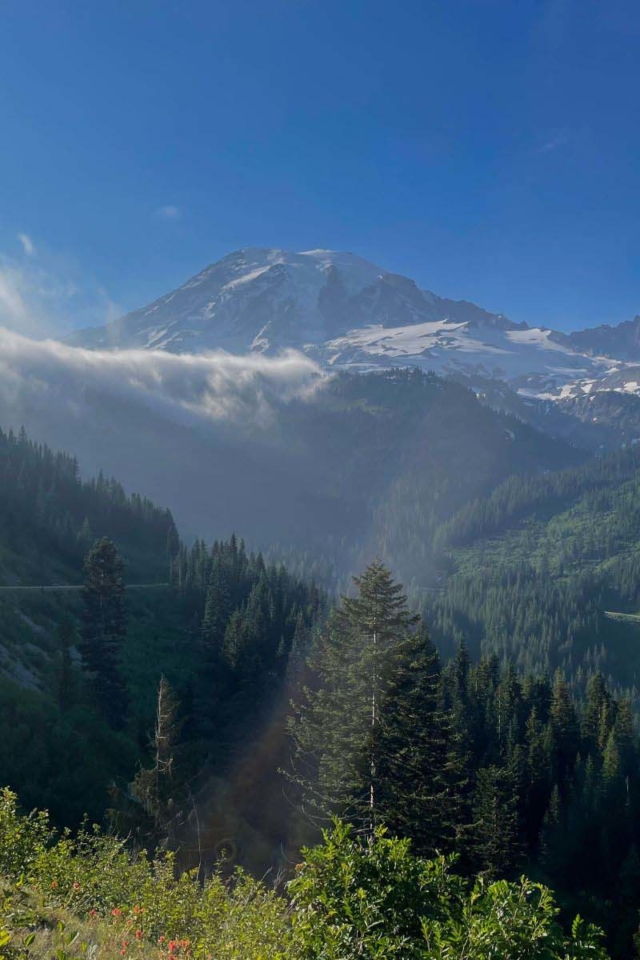
The Spray Park hike is another that’s found in the more remote area of the park, near Mowich Lake. You’ll have to make a 17-mile drive on a bumpy, gravel road to reach the trailhead, but once you get there, it’ll all be worth the effort.
For most of the hike, you’ll be in a forest, covered with tall trees. After a while, you’ll come to a sign that directs you to Spray Falls, which is just a short detour to see a small waterfall. If you have the time, I would add it in!
In the summer, beautiful wildflowers bloom in the Spray Park Meadows, filling the fields with bright colors. If you’re lucky, you might even spot a bear snacking on some berries along the trail.
Because of how rough the road into Mowich Lake is, many people will pair Spray Park and Tolmie Peak together to make it a day. But this can definitely be a lot for one day, so only do this if you’re an experienced hiker.
- Distance: 6.9 miles
- Elevation: 2,200 feet
- Estimated Time: 4 hours 30 minutes
- Type: Out & Back
- Area: Carbon River & Mowich
10. Pinnacle Peak
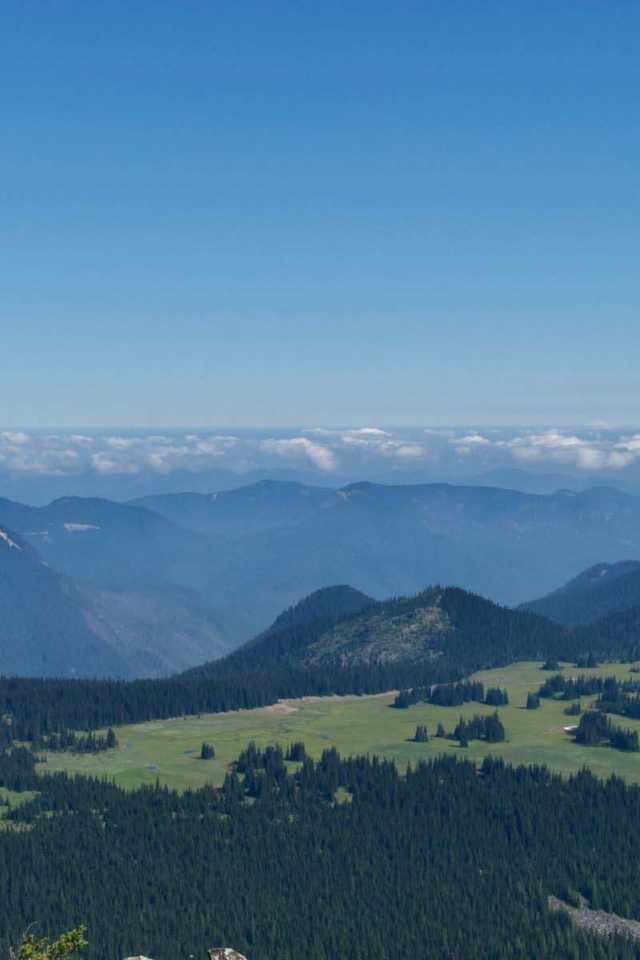
Start the hike to Pinnacle Peak by admiring Reflection Lakes, which are found right at the trailhead. Then, head onwards to this beautiful hike. It’s fairly short but gains quite a bit of elevation, so be sure to arrive prepared to work hard!
After some uphill travel, you’ll be met with a view of Mount Rainier from the Pinnacle Saddle at about 6,500 feet above sea level.
On a clear day, you might also even have the chance to spot some of Washington’s other famous volcanoes, Mount Adams and Mount St. Helens, in the distance.
- Distance: 2.8 miles
- Elevation: 1,400 feet
- Estimated Time: 2 hours 30 minutes
- Type: Out & Back
- Area: Paradise
11. Rampart Ridge
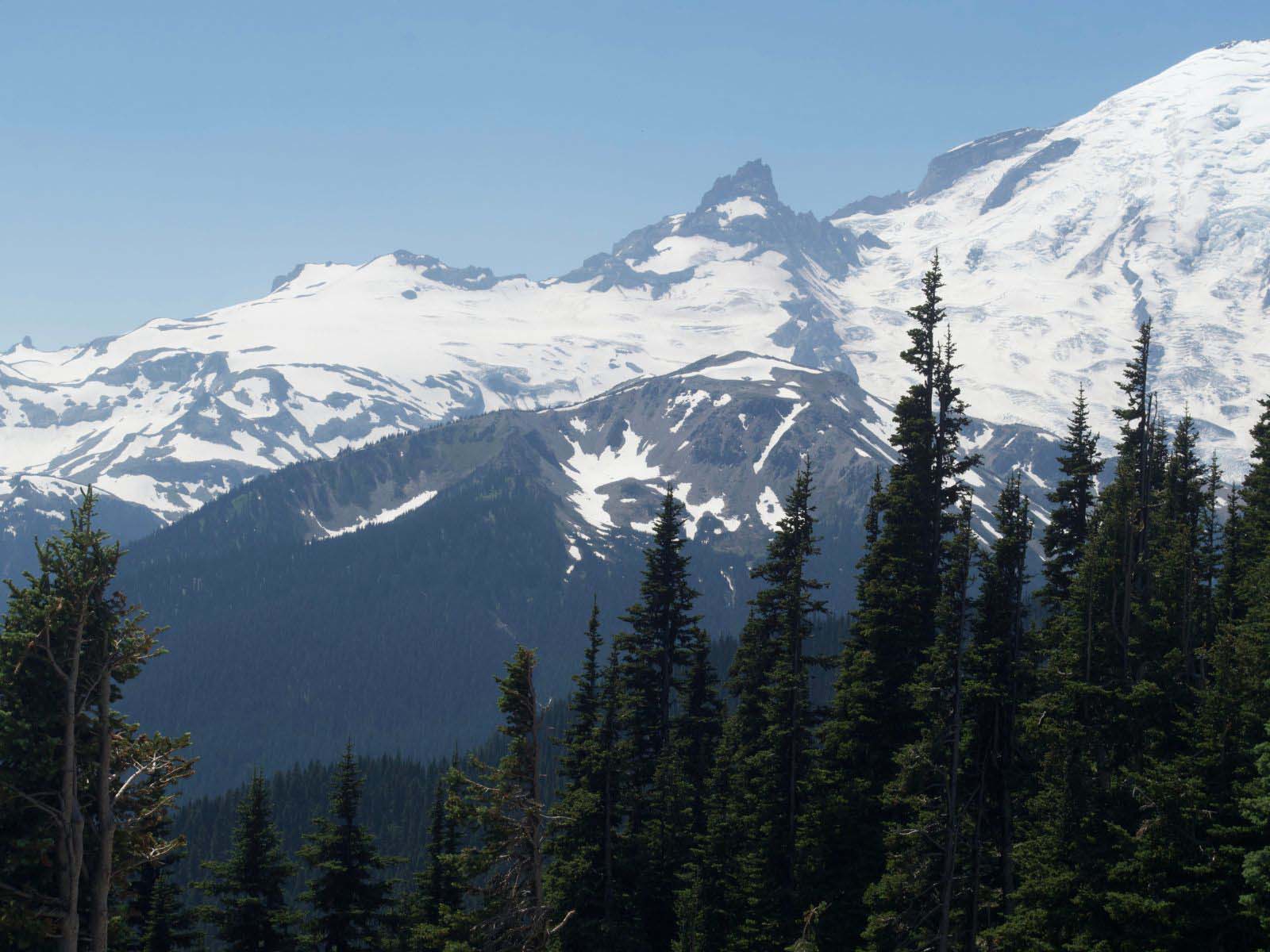
If you’ve already seen some of the best viewpoints in the park and are looking for something without a lot of people, I definitely recommend checking out the Rampart Ridge hike.
At just under 5 miles and a moderate challenge, you’ll have the chance to explore some of the national park’s forests. It’s recommended to hike the trail clockwise to get the steep inclines out of the way.
Most of the hike is through trees and forests until you reach a few views of Mount Rainier.
You’ll find the Longmire area of the park on your way to the Paradise area, on one of the main park roads. It’s where the park headquarters used to be located, and is open year-round.
The Rampart Ridge hike is a great hike year-round, but especially in the winter if you’re craving those mountain views but aren’t able to get up to other parts of the park due to road closures.
Many hikers strap on their snowshoes or microspikes for the hike when there’s snow on the ground.
- Distance: 4.8 miles
- Elevation: 1,450 feet
- Estimated Time: 3 hours
- Type: Loop
- Area: Longmire
12. Comet and Christine Falls
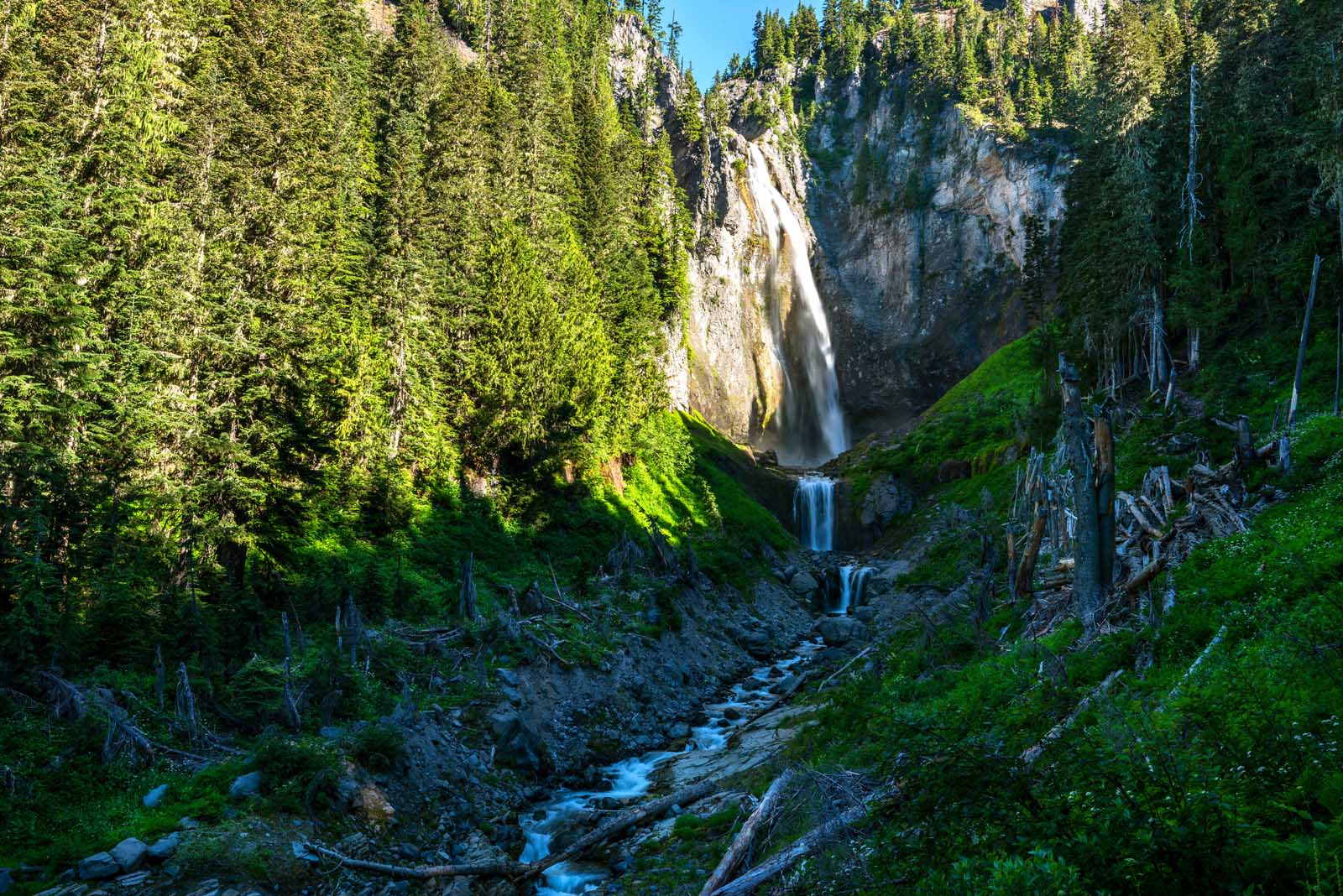
Here’s another hike that’s a bit different from many of the others in this national park, which are typically filled with mountain views.
You’ll start at the trailhead which is located on the road between Longmire and Paradise and will almost immediately have a view of Christine Falls.
On the way to Comet Falls, the trail winds along the Van Trump Creek and through the surrounding forest.
It’s the perfect way to spend a warm summer day in the park, because you’ll have tree coverage for much of the hike, unlike other trails nearby.
Comet Falls plunges about 400 feet down a rock cliffside, making it the tallest waterfall in Mount Rainier National Park.
- Distance: 3.2 miles
- Elevation: 1,300 feet
- Estimated Time: 2 hours 30 minutes
- Type: Out & Back
- Area: Paradise
13. Bench and Snow Lakes
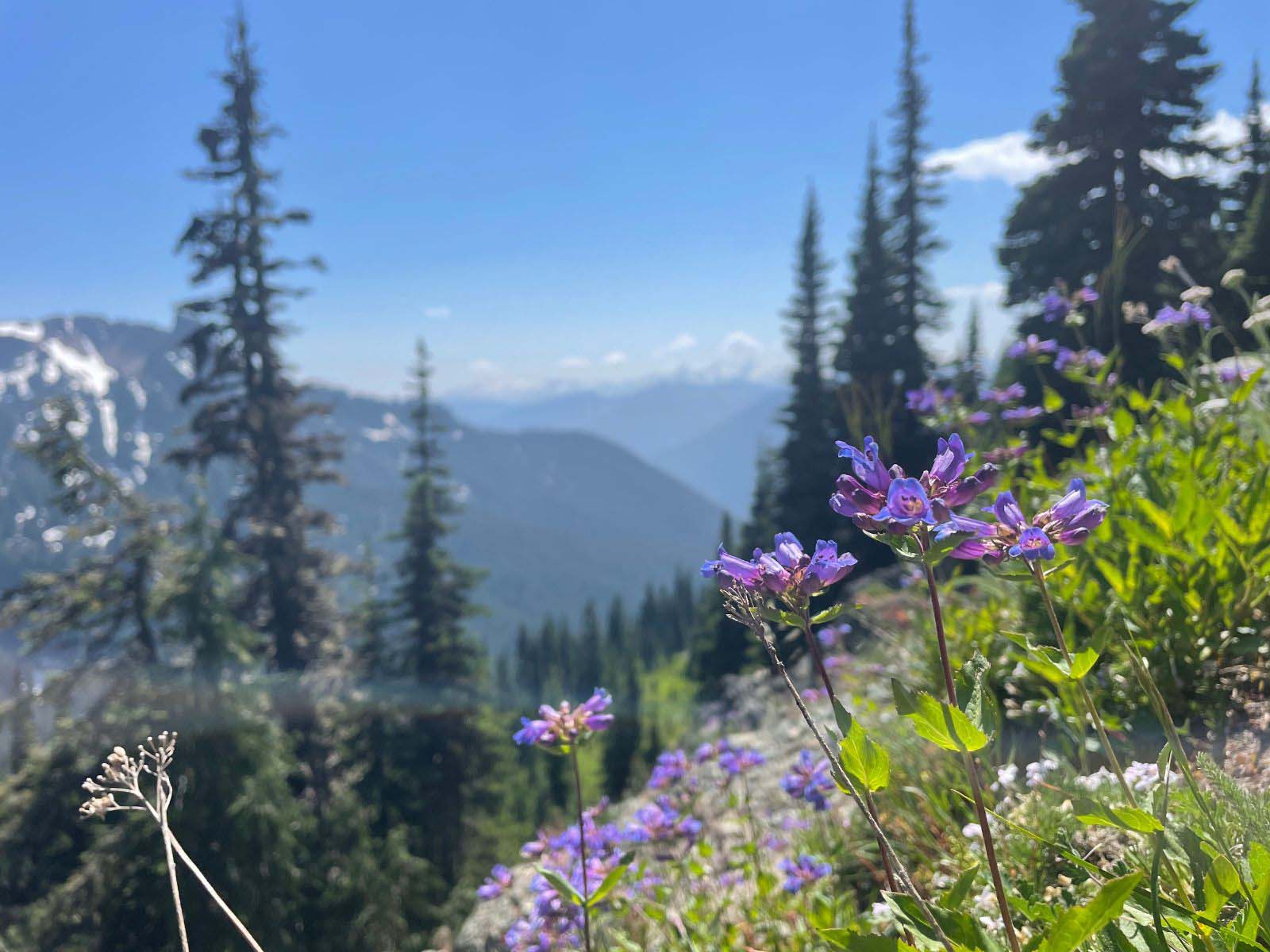
There’s really just something about hiking to a lake, especially when it has the incredible views surrounding it as Bench and Snow Lakes do.
You’ll hike for just about ½ mile on a roaming trail before reaching the first viewpoint of Bench Lake. Then, after another ¼ mile, take the left at the fork in the trail to head down and see a reflection of Mount Rainier from the shoreline.
Snow Lake is next, which offers more great views.?
This hike is especially great for escaping the crowds that fill the park in the summer because it isn’t as heavily trafficked.
- Distance: 2.2 miles
- Elevation: 500 feet
- Estimated Time: 1 hour 30 minutes
- Type: Out & Back
- Area: Paradise
Best Hard Hikes at Mount Rainier National Park
If you’re looking for something a bit more challenging and possibly a full-day adventure, check out some of these hard hikes in Mount Rainier National Park.
14. Skyline Loop
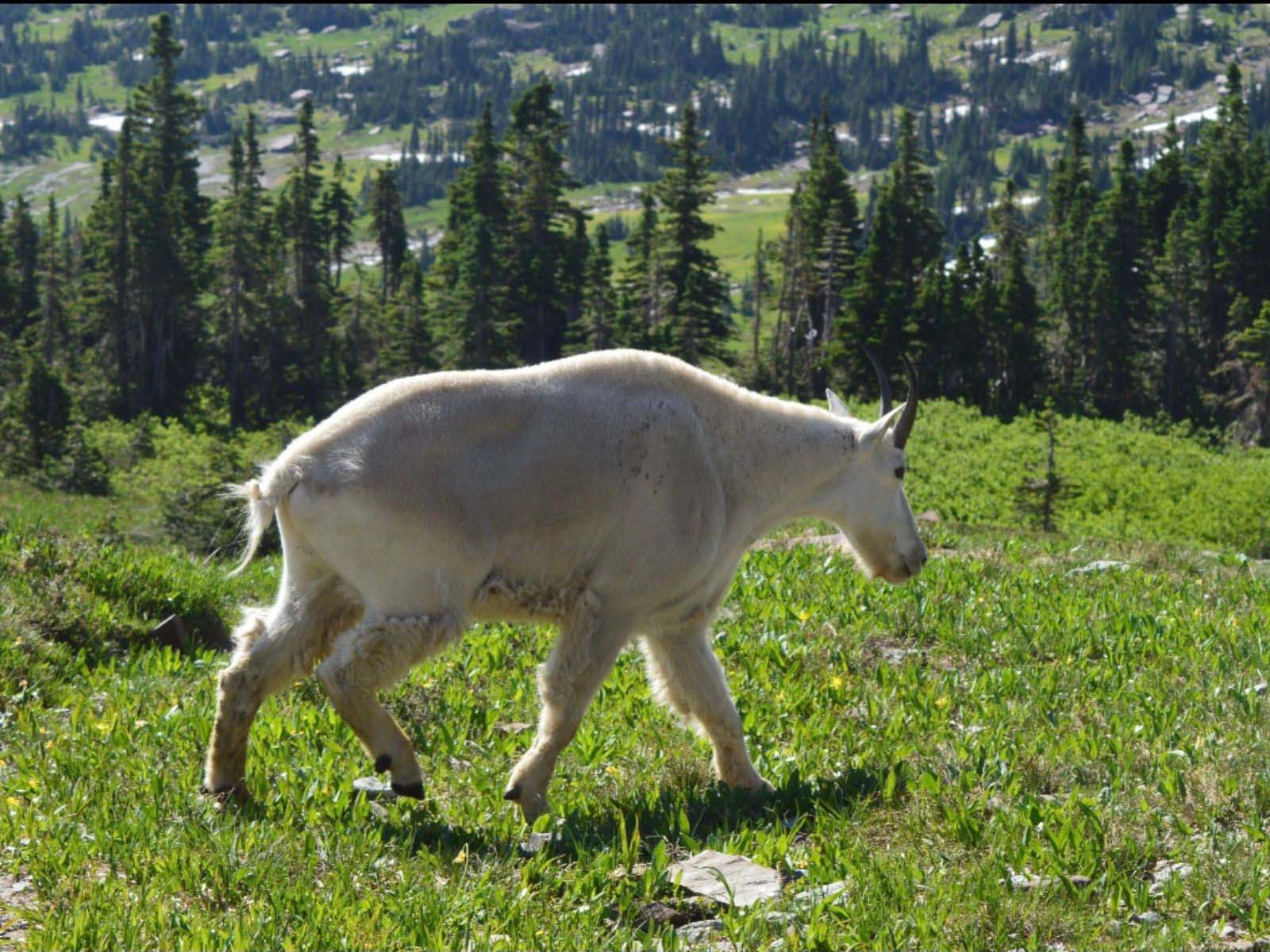
One of the most popular trails in the park is the Skyline Loop. The trailhead is found at the Paradise Inn. It starts off on a paved path, where you’ll hike up to Myrtle Falls before setting off for the rest of the hike, where it soon turns to dirt.
The entire trail is surrounded by incredible views of Mount Rainier and you truly will not be disappointed.?
The next stop is Panorama Point, which sits at about 6,900 feet above sea level. It’s a popular place to snowshoe to in the winter months, and even into July, there may still be snow on the ground.
No matter which direction you decide to go on this trail, you’ll have absolutely phenomenal views of the mountain for almost the entire hike. Besides Mount Rainier, admire the mountain ranges and meadows surrounding you.
And, you should keep an eye out for the cute mountain goats like the one in the photo.
- Distance: 6.2 miles
- Elevation: 1,800 feet
- Estimated Time: 4 hours
- Type: Loop
- Area: Paradise
15. The Wonderland Trail
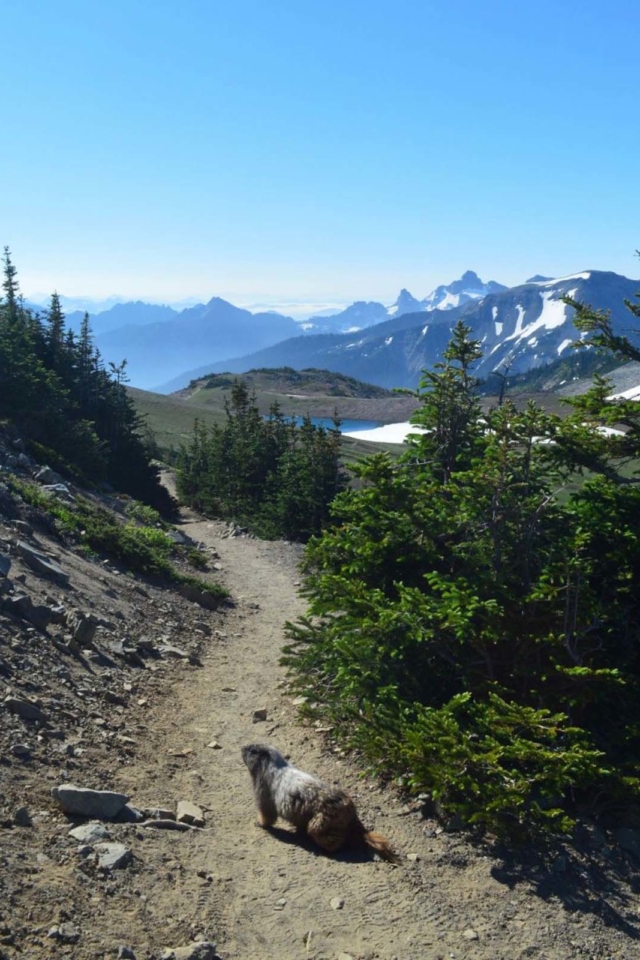
At almost 100 miles, the Wonderland Trail is a hike that many people have goals of completing as a backpacking thru-hike.
It loops around the entire base of Mount Rainier, offering hikers some of the most amazing views and experiences.
Many trails around the park do connect to the trail, so you don’t need to complete the entire thing to experience it.
You’ll experience all sorts of environments along this trail including rainforests, meadows, mountains, lakes, rivers, and more.
If you ever do want to complete the entire Wonderland Trail, be aware that it has a lot of elevation gain and loss and is of course very long.
- Distance: 96 miles
- Elevation: 25,000 feet
- Estimated Time: Thru-hike
- Type: Loop
- Area: Entire Park
16. Burroughs Mountain
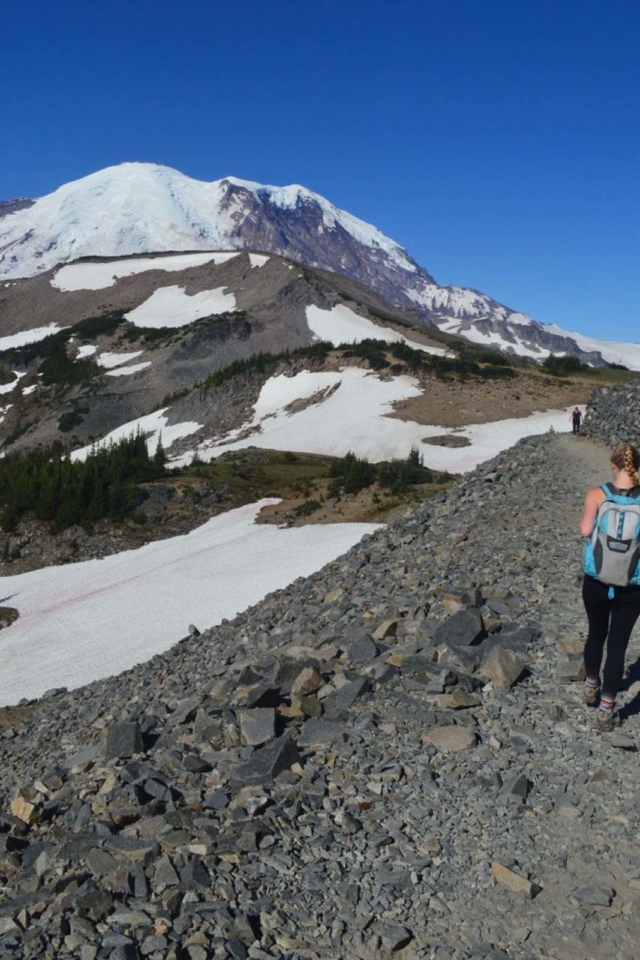
For a hike that really does it all, featuring all of what Mount Rainier is known for and has to offer, consider checking out the Burroughs Mountain Loop.
This long and strenuous hike starts at the Sunrise Visitor Center and goes in two different directions. Either way provides great views for the entirety of the hike, so choose your favorite and head out.
Along the loop, you’ll pass both Frozen and Shadow Lakes, along with overlooks of the meadows below. The trail meanders along both the Wonderland and Sourdough Ridge Trails, so you’ll also get a taste of both of those.
Once you’ve reached the junction for Burroughs Mountain, head onto the trail and keep on pushing until you reach the third Burrough. It’s really worth it to be that close to Mount Rainier, so just keep on going!
If you have some energy left on your way back, consider adding on the Fremont Lookout trail for an extra treat.?
- Distance: 9.4 miles
- Elevation: 2,600 feet
- Estimated Time: 6 hours
- Type: Loop
- Area: Sunrise
17. Camp Muir
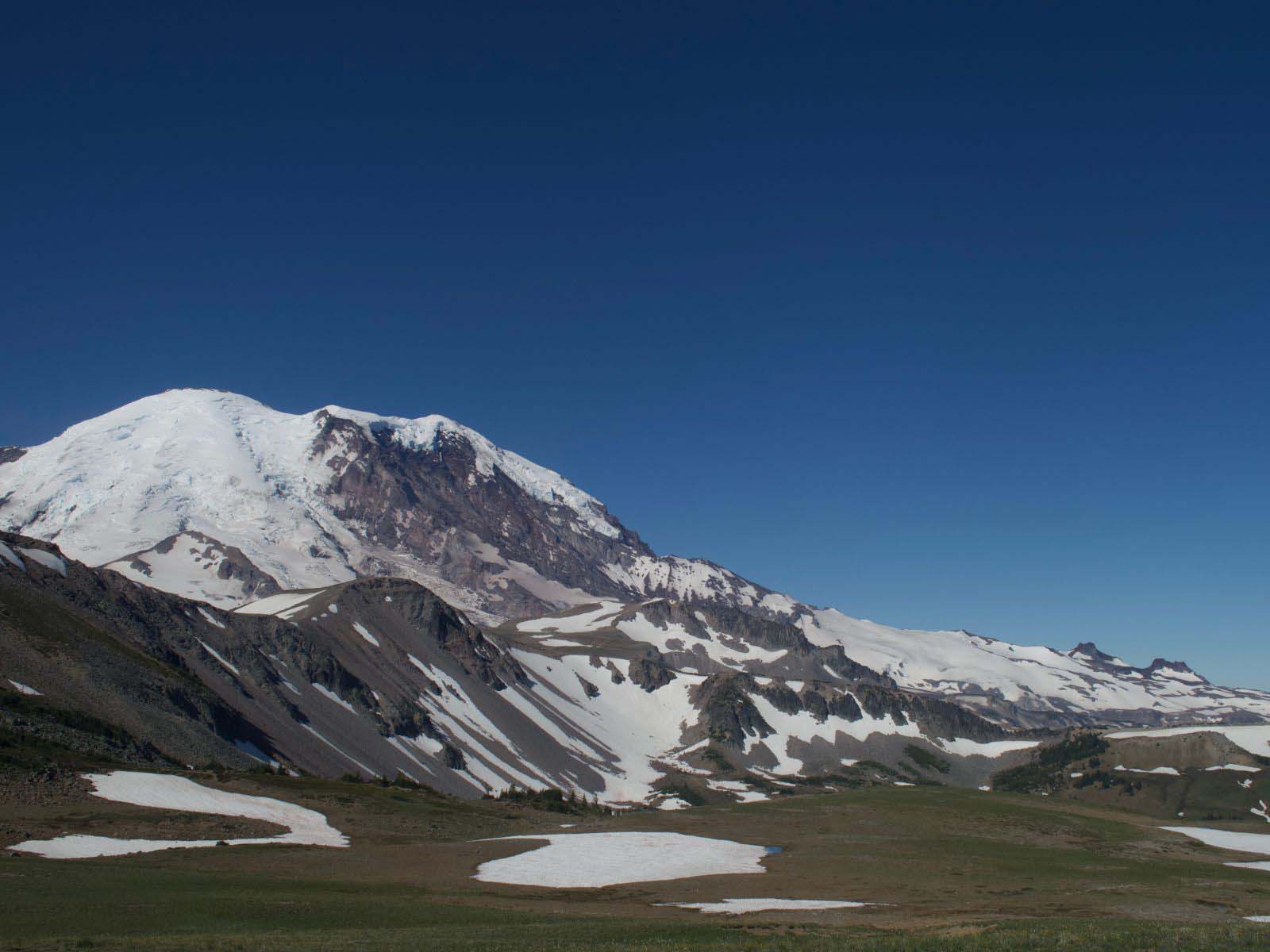
If you’re dreaming of getting to the summit of Mount Rainier but aren’t quite ready to commit to the technical aspects of it, then the Camp Muir hike is perfect for you.
Sitting at 10,188 feet in elevation, this hike is very strenuous and can actually be more like climbing at some points but gives you some epic views of the mountain.
It’s about as close to the summit as you can get without actually going for the top.
Check out the glaciers, crevasses, and beauty that lies up high on Mount Rainier that many other visitors don’t ever get the chance to see.
You’ll definitely want to start as early as possible and ensure that you have the proper gear because the weather can change in an instant.
- Distance: 10.1 miles
- Elevation: 4,900 feet
- Estimated Time: 8 hours
- Type: Loop
- Area: Paradise
Tips for Visiting Mount Rainier National Park
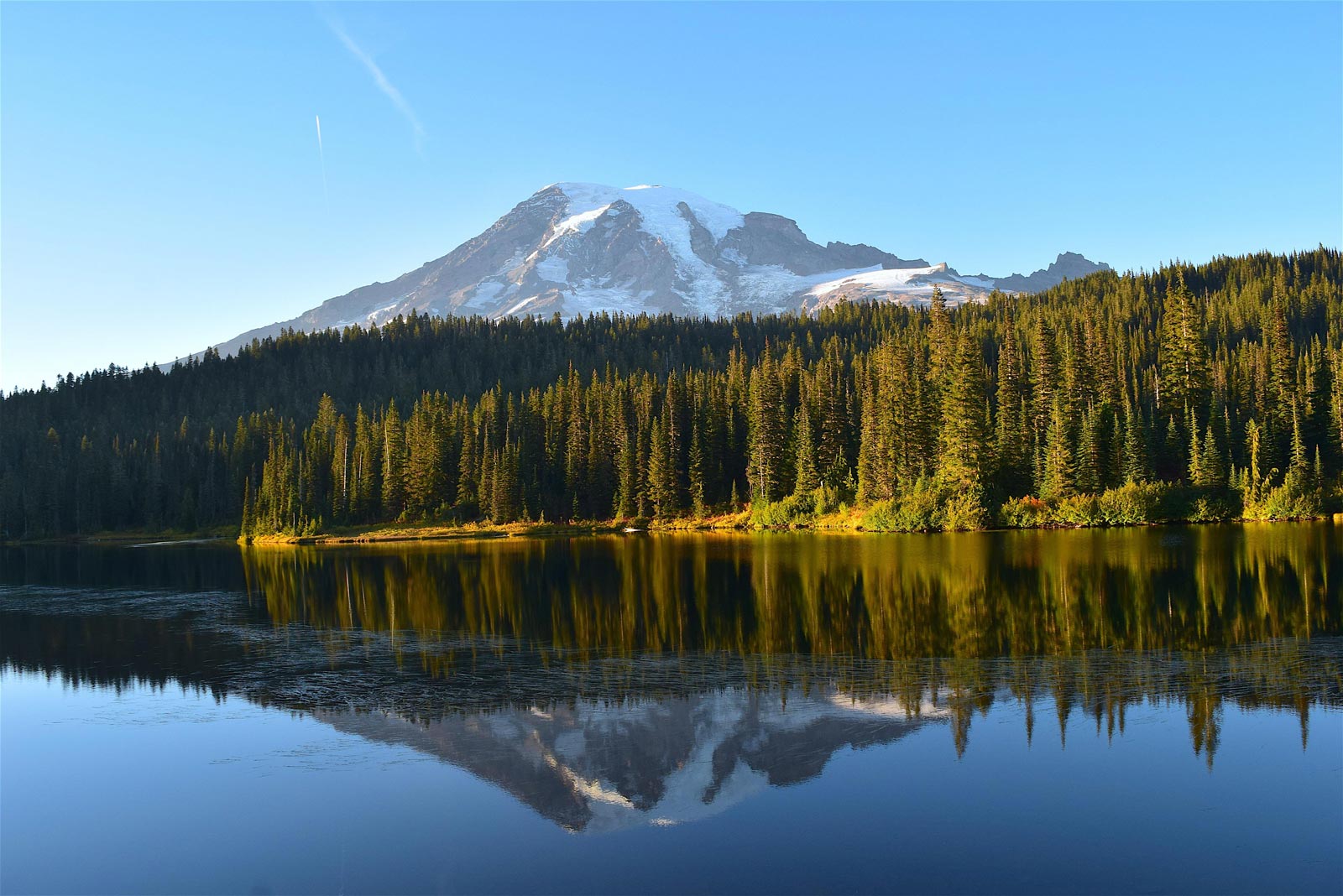
Now that you have a good idea of some of the best hikes in Mount Rainier National Park, let’s go over some of the best tips for making your visit as enjoyable as possible.
When is the Best Time to Visit Mount Rainier?
While Mount Rainier can be visited year-round, the winter months make it much more difficult to access.
It’s best to visit during the months of July and August to give yourself the best chance to hike in warm weather with no snow.
Wildflowers bloom in the summer, the temperatures are warm, and the views are phenomenal.
During spring and fall, there’s either lingering snow or it’s just starting to fall, and roads begin to close.
When snow hits the ground in the winter, you can visit Paradise and head out for a snowshoe, but some of the best parts to visit are closed.
Understand the Regions of Mt. Ranier National Park
Mount Rainier has 5 different regions to it, and all of these hikes are spread around these areas.
Before you put just anything into your GPS and start driving, you should know which of these 5 regions your planned hike is found in.
- Longmire Open year-round and considered the Gateway to Mount Rainier National Park, Longmire is closest to the southwest corner of the park
- Paradise: The main visitor center is found at Paradise, has many popular hikes, and is open periodically for recreation in the winter.
- Ohanapecosh: This part of the park is only open in the summertime and has a beautiful old-growth forest.
- Sunrise: This is the highest point that a car can reach within the park and is home to many of these great hikes. Not open in the winter.
- Carbon River & Mowich: In the far northwest corner of the park, this area is less visited than others and is only open in the summer.
Be Prepared for the Weather
The weather in mountains can change in an instant, so it is extremely important to be prepared for any type of weather during your visit.
Snow can be found on many of the trails anytime starting from September to July, depending on the year.
There may be no snow at lower elevations and feet in others! Be prepared for this with the proper gear.
Many of the hikes within this park have viewpoints that require it to be clear. So, I would also recommend checking to see if the skies will be cloudy before going. Read –
Avoid Weekends if Possible
If possible, try your best to visit Mount Rainier National Park during the week, rather than the weekend.
Parking can be a nightmare during busy summer days, especially at popular places such as Sunrise and Paradise.
Weekdays are likely to be much less busy and you’ll be able to enjoy the hikes much easier.
Grab an America the Beautiful Pass
Mount Rainier National Park requires a pass to enter and hike within the park. I personally think that it’s best to purchase an annual America the Beautiful pass, as it will give you the best bang for your buck. For $80 per year, you’ll have access to all national parks in the United States and many other locations. Pick one up here
Or you can purchase a daily pass for $30 per vehicle.
Where to Stay Near Mount Rainier National Park
Because there is so much to do at Mount Rainier National Park, it’s best to stay nearby to experience the most during your visit.
During the summer, you can book a stay at the Paradise Inn. If you stay here, you’ll be very close to most of the hikes in the Paradise area.
The Nisqually Lodge is another great lodging option that is located outside of the park in Ashford.
On the other side of the park, Crystal Mountain Hotels are near the Crystal Mountain Ski Resort and are closest to the Sunrise area of the park.
Final Thoughts
Of all the places to visit in the Pacific Northwest, Mount Rainier National Park is definitely one of the top locations.
With so many beautiful hikes, many of which are easy and family-friendly and others that are great for more advanced adventurers, you’re sure to find the one for you.
All of these awe-inspiring hikes in Mount Rainier National Park should surely be added to your bucket list.

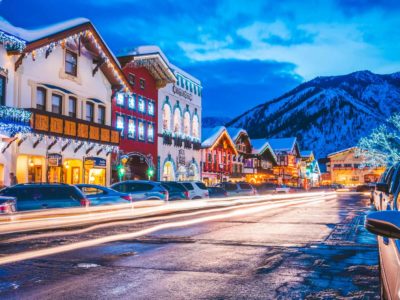
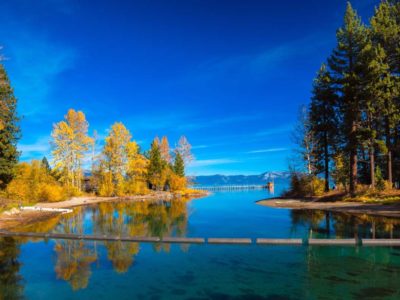
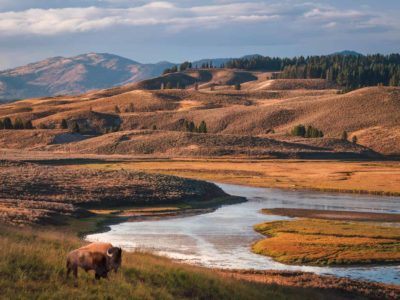
This is very informative and adventoureus blog for travellers.
What is the best season to visit Mount Rainier?
Damn! I am going to visit there very soon. I am so excited about the place after reading this blog, thanks for sharing this with us.
Grove of the Patriarchs is closed until further notice (posted June 26, 2022) Also Steven’s Canyon road is still closed so if you are coming or going from Packwood to Paradise it might be better to go through Morton and up through Ashford past the Longmire entrance.
What is the best season to visit Mount Rainier?
Early or late summer. If it’s an Indian summer then you may get a week or 10 days of perfect weather at the end of September > 1st few days of October. Less crowded after Labor Day. There is often still quite a bit of snow cover at the beginning of June so don’t get too quick of a jump on it. Check cams/weather first.
What a nice blog and info. Thanks